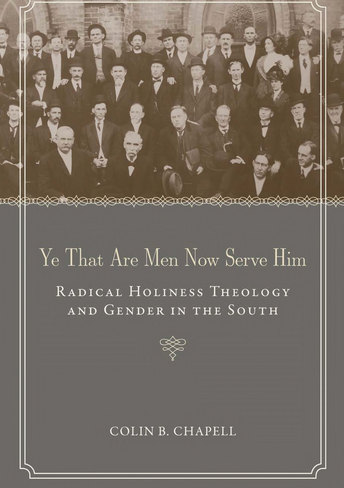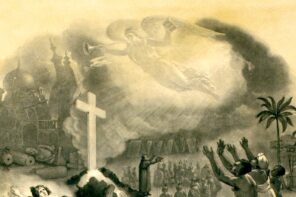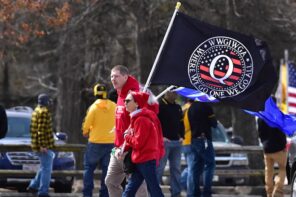Historian Colin Chapell’s latest book explores gender in the South through the lens of the Holiness movement.
What inspired you to write Ye That Are Men Now Serve Him?
I am fascinated by the ways in which people’s religious beliefs change how they see and understand the world around them. Of course, to the faithful, this is axiomatic—they expect their faith to change their worldview. Yet, with a few notable exceptions, I had not seen many scholars seriously examine the ways in which faith influenced gender construction. There are important works on how faith had an impact on the roles that men and women could do, on the level of institutional authority they could assume, but little had been done on how masculinity and femininity were actually thought of, and how theology changed these ideals.
What I wanted to do was establish a “baseline” of normative ideas of gender among white Protestants by looking at Southern Baptists and Methodists. By examining the emergent Southern Holiness movement, I was able to see how changes in theology altered—often radically—the ways in which personal identity were perceived. Examining these changes, both in theology and gender construction, thus demonstrated how important faith commitments are to how the faithful view the world.

Ye That Are Men Now Serve Him: Radical Holiness Theology and Gender in the South
Colin B. Chapell
University of Alabama Press
September 2016
What’s the most important take-home message for readers?
Theology and belief matter to how people view not only the world around them, but how adherents view their own identity. I know that this may sound simple, but we so often forget this. Indeed, I would enlarge that statement to say that the values people hold dearest change how they understand their own identity. If academic achievement and the number or type of initials after your name is the most important thing in the world to you, then it will change how you view your own masculinity and femininity. Similarly, if having children matters most to you, then you can only be truly “manly” or “feminine” if you have kids.
Is there anything you had to leave out?
Historians always want to include every interesting anecdote and vignette from their research. We spend so much time in the archives, getting to know our subjects, and often working with very, very personal letters, diaries and family papers. There were plenty of personal details that I thought could have added more “personality” to some of the folks that I talked about, but would have been distracting to the larger points that I wanted to make in specific chapters and the book itself. College-age sons getting into trouble, tirades against the fads of the time (such as “auto-cars”), lovingly tender letters from gruff husbands to their wives all had to make a point or get cut.
What are some of the biggest misconceptions about your topic?
There are two groups of people that often have “interesting” ideas about faith commitments and personal identity. On the one hand, there are folks who think that belief is merely a thin veneer for other interests. This feeling has mostly fallen out of fashion as religious studies scholars and historians of religion are producing great works right now that demonstrate how significant belief is for most people. We all know that there are varied influences on people’s identity, but for a time, there was the idea that religious belief was solely a stand-in for other interests. I simply think that idea is wrong. I want to be clear that I think that religious belief can be, and often is, intertwined with other things, but it is still a defining variable in establishing personal identity.
On the other hand, there are people who believe that gender construction, what it means to be a man or woman and how that looks in society, is a static and timeless idea. They want to harken back to a time when “women were strong, men were good-looking, and all children were above average” to paraphrase Garrison Keillor. They do not want to look at how masculinity is presented differently in West Texas than in Manhattan, both of which are vastly different from what it means to be manly in contemporary Quebec, and certainly different than ancient Ethiopia. Not to wade too much into contemporary debates, but gender construction, both in its perception and performance, is highly dependent on culture.
Did you have a specific audience in mind when writing?
I am a straight, white, Evangelical Protestant male, and I grew up among a lot of folks just like me. While I do not share a lot of political views with the people those words describe, I tried to keep those folks in mind as I wrote. I wanted to keep them engaged, because I don’t think you can change minds if your audience stops listening. This meant that I had to demonstrate that I respect their faith. At the same time, I wanted to challenge them to rethink some ideas about what goes into constructing a personal identity–perhaps even convincing them that personal and gender identity is a construction in the first place.
Are you hoping to just inform readers? Entertain them? Piss them off?
I am trying to do a little of all of those things. I certainly want to inform my readers, but I also want to challenge them. Hopefully in ways that would keep them engaged. I want readers to think about what goes into forming their own identities. If they have religious commitments, how does that theology play into their ideas about womanhood and manhood? I realize that many of my readers will be involved in academia in some way, and so I want them to think about how graduate school and higher education has warped their ideas about personal identity. What we consider important alters how we view ourselves and the world around us.
What alternative title would you give the book?
I’d probably call it Defining Faiths: Gender and Religion in the South.
How do you feel about the cover?
I was delighted at how the cover turned out. The folks at the University of Alabama Press really did a great job on it, and I’m really happy with their work.
Is there a book out there you wish you had written? Which one? Why?
I think most academic historians want to write a best-selling, Bancroft and Pulitzer Prize-winning work with the prose skills of Michael Chabon! I don’t know if there’s a specific book out there that I wish I had written. For me, I want to improve my craft all the time. That being said, Gail Bederman’s Manliness & Civilization and Matthew Frye Jacobson’s Barbarian Virtues are two of the most influential books for me, so I’d have loved to have written those!
What’s your next book?
I’m in the early stages of my next project, exploring how Holiness adherents understood and demonstrated their identity as sanctified individuals and as part of a sanctified community. For some of this, I will be looking at the connections they made here in the United States across regional lines as well as with their co-religionists in the English Keswick Movement and Welsh Revivals of the early 20th century.





